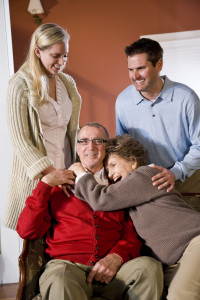Who are the Caregivers?
Almost every one of us will provide some form of caregiving in our lives. Some people will be trained and employed in specific fields of caregiving, but most will be everyday people who volunteer their time to help friends, family members, and neighbors.
A caregiver is defined by Merriam Webster dictionary as "a person who gives help to someone (such as a child, an old person, or someone who is sick)," or "a person who provides direct care (as for children, elderly people, the disabled or the chronically ill)."
There are live-in caregivers, companion caregivers, and family caregivers to name a few possibilities.
Caregivers provide support and care to reduce the suffering of another, and assist in coping and functioning. Caregiving can reduce the financial burden on families and governments, often to the detriment of the caregiver's own well-being. Caregivers tend to be empathetic individuals; they may also be professional individuals who possess the skills, training, and accreditation to provide support within a defined job description.
 The characteristics of a caregiver may be defined simply by looking into your mirror.
The characteristics of a caregiver may be defined simply by looking into your mirror.
A 2001 census in the UK revealed that 6 million or more people provided unpaid care for a relative, friend, or neighbor and at least one third of all people will be providing care to another in their lifetime. Further, more than 175,000 caregivers are under the age of 18. More than 1.5 million people under the age of 25 in Australia are facing care responsibilities for an elderly or disabled person. More than 10 million people are needed to provide care to an aging population in China. And in the US, 43.5 million adult family caregivers care for someone aged 50 and older and 61.6 million people have provided unpaid care to another in the recent past.
Unpaid caregiving provided by volunteers and family members saves government billions of dollars annually in providing care for the elderly and the disabled; it eases stress on the health system and the support of the caregivers is encouraged to continue.
This altruism and responsibility however comes at a cost to the caregiver in the toll it takes on them physically, mentally, emotionally, and financially; indeed there is a term for it, it is called "caregiver burnout" and individuals are encouraged to read up on the subject. Precautionary measures, such as learning to deal effectively with the downsizing of our estates, as well as how to protect our health, will help to ensure our own well-being and the well-being of those who will be tasked with our care.
(An excerpt from Estate Downsizing for Caregivers by Susan Bewsey)





